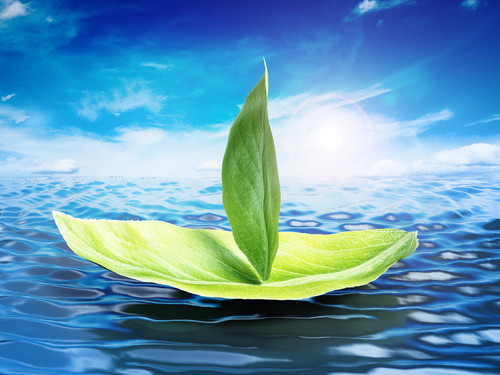To meet pressing environmental targets, ship operators need to start implementing green technologies now in order to experience the full benefits later, writes Aleksander Askeland, Chief Sales Officer of Yara Marine Technologies.
As this year’s World Maritime Day draws focus to ‘new technologies for greener shipping’, we have an unprecedented opportunity to analyse how our industry can make full use of emerging low-emission solutions. However, while we are often urged to think of the entry of new technology as a complete solution for decarbonisation needs, this is not often the case in an industry as complex and multifaceted as shipping.
Instead, I would say that there is one single resource that marks the true difference between success and failure in using new technologies: time.
Any new technologies entering the market will have already gone through a rigorous and lengthy development process before reaching the maturity to be used commercially. Speed is of the essence as we endeavour to meet our emission reduction targets, and the maritime industry has already lost time waiting for current solutions to emerge.
But for most technologies – whether engines using alternative fuels, energy saving devices or fuel optimisation software – installation on a vessel is just the start of a long process before ship operators, and the wider industry, can benefit from the full impact these technologies can bring.
This is not just about calibration time at early stages. Of course, engines need to be run in and fine-tuned, the ideal operating circumstances established for energy saving devices, and optimisation software often requires a sizeable source of real-life operations to learn from and improve. But more important – and likely lengthier – is the time taken for crews to learn how to use new technologies in an optimal manner.
Impacting safety onboard
Yara Marine has long understood that new technologies need to be designed with ease-of-use as a primary consideration. The workload of seafarers is heavy enough without further complicating their jobs any more than is absolutely necessary. While ship owners and operators may decide on the technologies that will help them decarbonise, it is the crews that will bear the immediate responsibility for using them. Solutions that do not make the crew’s lives as simple as possible, risk being used grudgingly, sparingly, or not at all.
But product design can only reduce, not eliminate the time crew will invariably need before they can make the most of any new solution. Most technologies will require operators to invest in training, potentially another long process when a system is rolled out across a large fleet. After the training, it may still take time for crews to fully adapt to the new equipment and make it part of their operational routines.
It is essential that we as an industry understand and invest now to develop the kinds of green training and upskilling for seafarers that will be needed to capitalise on the benefits new engines, fuels and technologies offer. Safety must be at the forefront of this.
Assessing financial incentives
Aside from training and familiarisation, an early introduction of new technology will also allow ship operators or other stakeholders to make any supporting investments that may have been overlooked. In the case of shore power, for example, equipping vessels with charging capacity can act as an incentive to port authorities and terminal operators to deliver the required facilities. The greater (and quicker) the uptake at ports, the more value a ship operator can hope to gain from its investment in this capability.
Early movers will drive positive change in our industry. Depending on the solution, wide uptake can demand new shoreside facilities, operating procedures, training standards, local safety requirements or class rules to be developed. These naturally take time and while they are in place for some of the current solutions that promise big emissions savings, in other areas they are still lacking. When LNG was being developed as a marine fuel, the phrase ‘chicken and egg’ became shorthand for the phenomenon of terminals waiting for LNG-fueled ships to invest in bunkering infrastructure, while ship operators waited for LNG bunkering availability to invest in gas-fueled vessels. But if we are to play our part in tackling climate change, we cannot afford to have similar situations.
And as much as technology itself may evolve, the fundamental principles governing our industry are unlikely to change. The fastest route to decarbonization will always be minimising fuel use, even after the industry transitions to greener options. Alternatives such as hybrid propulsion systems, for instance wind-assisted technologies, can help meet regulatory standards while also bringing further savings to the table. AI-based technologies that offer route planning and smart voyages can maximise fuel efficiency and time saved, improving overall operational efficiency.
All of these are existing green measures already available in the market that shipowners, operators, and charterers can implement now.
Although making investment decisions and banking on solutions may seem daunting, we cannot afford to wait. Both the shipowners need incentives to act on time by installing new technologies, crews need time to familiarise themselves with these new systems, and other stakeholders to begin work on the structures and frameworks ships need to operate.
Anticipating upcoming regulations
Promisingly, one of the biggest reasons for shipowners to act early is to maximise the emissions savings they can deliver. At SMM 2022 there was plenty of discussion to suggest that there is scarce time left for shipping to meet its climate obligations. One major engine designer suggested shipping already risks ‘emissions overshoot’ – missing IMO’s 2050 target for greenhouse gas emissions reduction – unless dramatic immediate action is taken. The president of a leading class society argued that it was irrelevant to talk of strengthening the 2050 ambition as we are unlikely to meet the current target unless alternative fuels become widely available quicker than anticipated.
Whichever way you look, it is clear that time is running out to save the planet and we need to act now to move the needle on decarbonisation.
Launching ourselves on the implementation-familiarisation-optimisation trajectory as soon as possible is the only option. This way we can allow shipping to make the most of the solutions available to it today. Starting now will not only optimise the impact of any measure, but also give us the most time to both prepare for the unexpected and to introduce new solutions with greater emissions advantages as they become available. Simply waiting for new, miracle solutions to emerge is not a choice. Upcoming regulations will come into play regardless of whether you are ready for them. It’s time to take action now and utilise current resources.
Shipping regulation has long made use of the ‘experience-building phase’, a period after new regulations are put into force where the directives are enforced only in part or not at all. The idea is to give operators time to iron out any challenges posed by new regulatory impositions. We have already seen the necessity of this transition period when ship owners had to install entirely new systems in response to IMO’s Ballast Water Management Convention, for example, and we are likely to see a similar response as operators look to comply with incoming EEXI and CII regulations.
The value of experience
Fortunately, we are already better prepared for the latter because previous Conventions have given us time and experience with executing new regulations, allowing us to assess what works and what does not. As a result, when it comes to assessing a time frame and undertaking the learning curve for compliance with EEXI and CII measures, we can use the measures we previously developed to ensure successful implementation.
Experience tells. Anyone in shipping knows this truth, and we are an industry that thrives on knowledge building and lessons from the past. We need to ensure that we apply it here as well, acting on the good knowledge we have now and giving ourselves the time we need to normalise and sustain the change we need to achieve our decarbonisation goals. This is how we save our planet – by normalising change and building a greener future, one step at a time.
The views presented hereabove are only those of the author and do not necessarily those of SAFETY4SEA and are for information sharing and discussion purposes only.































































